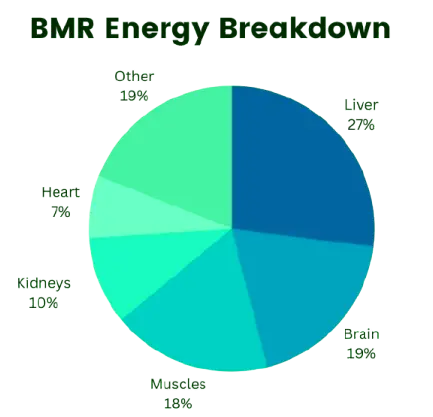Basal Metabolic Rate (BMR) Calculator
Calculate your Basal Metabolic Rate (BMR) to determine the precise number of calories your body needs solely for resting, vital functions.
US Units
Metric Units
ages: 15 - 80
BMR = /day
| Activity Level | Calorie |
|---|---|
| Sedentary: little or no exercise | |
| Exercise 1-3 times/week | |
| Exercise 4-5 times/week | |
| Daily exercise or intense exercise 3-4 times/week | |
| Intense exercise 6-7 times/week | |
| Very intense exercise daily, or physical job |
Intense exercise: 45-120 minutes of elevated heart rate activity.
Very intense exercise: 2+ hours of elevated heart rate activity.
Calculation Examples
📋Steps to Calculate
-
Provide age, gender, weight, and height.
-
Choose metric or imperial units.
-
Click "Calculate" to get your basal metabolic rate.
Mistakes to Avoid ⚠️
- Confusing BMR with TDEE: BMR is *only* resting calories; TDEE includes BMR plus activity.
- Using the older Harris-Benedict formula when the Mifflin-St Jeor (1990) is generally considered more accurate.
- Failing to re-calculate BMR after significant changes in weight (gain or loss).
- Ignoring muscle mass: two people with the same BMR may have different body compositions.
Practical Applications📊
Estimate resting calorie needs for weight management.
Integrate with our TDEE Calculator for daily calorie planning.
Track changes with regular weight or muscle updates.
Questions and Answers
What is a BMR calculator?
A BMR estimator calculates your basal metabolic rate, the amount of calories your body uses at rest for vital functions. It is based on your age, weight, height, and gender, and our free online tool provides an accurate estimate of your BMR to guide your fitness goals.
How do you calculate BMR?
To determine BMR, enter your age, weight, height, and gender into the BMR estimator, which uses the Mifflin-St Jeor equation to provide the amount of calories your body burns at rest. This estimate helps you plan your calorie intake for fitness and weight management.
Why use a basal metabolic rate calculator?
A basal metabolic rate estimator helps you determine how many calories your body burns at rest, which is essential for creating an effective diet plan. Using our BMR tool, you can get a personalized calorie estimate to help with weight loss, gain, or maintenance.
What is a good Basal metabolism for my age?
A good BMR varies by age, gender, and body composition, but generally, it decreases with age. Use our BMR estimator to input your details and get an accurate estimate based on the Mifflin-St Jeor formula, which is reliable for most adults.
What formulas are used in the BMR Calculator?
The BMR Estimator uses the Mifflin-St Jeor equation, which calculates basal metabolic rate based on age, weight, height, and gender. This formula is endorsed by the American Dietetic Association for its accuracy in estimating calorie needs at rest.
How can BMR help with weight loss?
Basal metabolism helps with weight loss by showing the minimum calories your body needs at rest. By using our BMR estimator, you can create a calorie deficit safely, combining it with activity levels to achieve sustainable weight loss without compromising health.
Does the BMR estimator account for muscle mass?
The Metabolic rate calc uses standard formulas like Mifflin-St Jeor, which do not directly account for muscle mass but provide a reliable estimate based on age, weight, height, and gender. For more precision, consider body composition tests alongside the tool.
Disclaimer: This calculator is designed to provide helpful estimates for informational purposes. While we strive for accuracy, financial (or medical) results can vary based on local laws and individual circumstances. We recommend consulting with a professional advisor for critical decisions.
